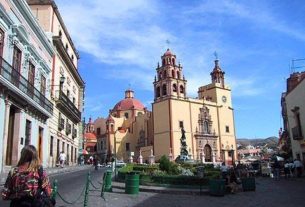Only the official registration form on file in the archives and my now-aging memory can attest to Celestino’s entry in the 1952 contest, the year of his biggest loss. The neighbors only saw him carry from his workshop a lump the size of a small dog like those that sleep in the street, covered by several old checkered aprons. His entry remained not only un-recognized and un-ribboned, but also largely unseen, except by a six-year-old boy, who fifty years later cannot be certain that he understood the depth of grief expressed in Celestino’s entry that year. “Creation whispers its own message.”
was it the
rains?
;ay, poor
Celestino
so
beautiful
The gossip was a hushed, gray fog that soaked into the ground and squished under people’s feet. It swirled into bedroom windows and around dinner tables.
so
happy
gone
now
and what about his
radishes?
Those days in Trinidad de la Huerta, the gossip lay glistening on people’s tongues mixed with a taste of tortilla flecked with sorrow.
He spent the rest of the year shaping fragrant woods, but dedicated the weeks preceding Christmas to his radishes. Celestino’s artistry with the twisted roots guaranteed him the top prize every year in the competition in the capital city. Most of the neighbors grew radishes, hoping to have one to inspire Celestino toward the prize. They gave him radishes that could be a fat devil or a two-headed goat, an old automobile or Jesus in a huipil. He could always breathe life into them. Fanciful sometimes, or realistic, dreamlike or pious – his themes were inspired by the ruddy spontaneity of the radishes themselves. Like a child who finds faces in the clouds, Celestino saw squirming toes and blinking eyelids in his radishes. Nobody else seemed able to coerce the same kind of movement from those roots whose heart grew burled in their soil. Nobody else could catch radishes in those evocative poses that brought Trinidad de la Huerta the applause of the capital. This year the gossip crept in with tendrils of doubt – what would Celestino do with the tragedy so recent?
And as it has been recorded by the gossip of that town, this is what he would do: He would bury his wife and baby daughter in the plot he had expected to warm with his own bones first. Between the long box and the tiny one he would bury a sack of prized radishes. He would draw the curtains in his house and stuff old sheets in to the cracks around the door. He would refuse to eat for four days. And from sundown to sunup he would sit in the dry earth of his garden with his head in his hands, rocking and spilling great handfuls of tears. He would crawl like an animal and tear the ragged leaves from the giant tubers that remained beneath him still in the soil the color of good coffee, and dig with his fingers to feel the knobs and bulges that could be an elephant trunk or a castle tower.
Planted on the appointed day and treated to the best goat manure, the radishes had survived unblemished the unusual winds and rains of the season. Now with his hands buried within the mantle of earth he would snap the arms and tails from their bodies and twist the knobby noses to disconnect them from their undeserving heart. He would yank them from the soil, hearing them groan as they left their comfortable womb. Tears would stream from his eyes and nose and ears and mouth and the pores in his scalp and the soles of his feet. A puddle would form around where he sat and soak quickly into an earth that was turning to dust. At night’s end his pile of disjointed red roots would be the size of a large sleeping dog. And during the day he would lock himself in his workshop to prepare his entry in the radish competition.
The townspeople did not knock on his door when they left him their radishes that looked like winged creatures and bent old men. The sodden gossip had dampened every corner and they knew the darkness inside Celestino’s house, but did not want to meet it face to face. No one knew what to say to the man alone.
Inside his workshop, Celestino was flaying the radish pieces, flaying them by peeling their ruddy skin away from their flesh slowly. Holding the red skins in his hand he shaped tear after tear after tear with his knife, cutting through to his palm, etching there a map of his grief twined with his lifelines stained by earth.
This is for the wind that blew in from the north.
This one for the rains that came too hard.
This for not complimenting Irma on her marrow soup.
Another for my daughter’s braid that I will never weave.
Other many tears for the mothers who die in childbirth,
living and dying their biggest fear
and their biggest joy in one pure moment.
This one for the doctor that is far away.
Another for a mother’s greatest joy that dies along with her.
This tear for the father, for me –“Poor Celestino”
I hear them pass the words between them like a warning.
“Celestino left alone and afraid.”
“But Celestino can have no more fears for they landed in his life at once, in that one pure moment. And now they have disappeared into a past that will accompany me as my only proof of having once lived.”
He questions the earth,
He questions himself,
He questions time.
He does not question the child. “Creation whispers its own message,” he would tell me many years later. He carefully carved “IRMA” through 1,586 tears in an artful script that took more concentration than cutting an eight-spoke carriage wheel from one solid radish piece.
Upon arriving in Oaxaca on the night of December 23, Celestino wrote the title of his entry in a bold, black hand on the sign that hung in the space reserved for him. In one meter square he dumped an amorphous pile of radish shavings and sprinkled the mound from a green bucket with holy water the padre had given him after the funeral. The zocalo was alive with the movement and hum of the crowd waiting hours in line to see the parade of whimsical radishes. Vendors sold warm pancakes, corncobs smothered in cream and confetti-filled eggshells. The air prickled with an anticipation that was not diminished by one somber corner containing a sad man and a pile of kitchen scraps. The crowd did not see Celestino. They talked about their families and the price of shoes as they moved quickly past to the next exhibit called “To Etla Market on the Fifth Friday of Lent” that had funny oxen with three legs and a cartful of radishes carved to look like radishes. In 1952, this exhibit won the prize that Celestino took home every year but this.
I was a six-year-old wrapped in innocence. At that time I had no awareness that anything could hurt more than a hard fall from a tall tree. I could not know what Celestino was whispering with his radishes that night in the zocalo. I saw his pile of peels and carefully sounded out the title… “La-gri-mas” it said… “Tears”. I pushed between the legs of the crowd and slipped off the raised observation walkway to poke my hand into the pile of shavings. I remember the flush of discovery as I let them fall through my fingers. Feathers. Fallen from a big radishy bird that no longer needed them; shed so new ones could grow in their place. I knew something about these things. My mom had a cenzontle in a cage by the kitchen window.
–Hey mister! Why did you make so many feathers?
–Lot you know! Leave me alone!
I remember he sat solidly in a folding chair, his head in his hands. I could not see his face.
–Yeah, well lot YOU know! These can’t be tears, mister… Teardrops only look like this when there’s only one of them. Once you’ve cried a bunch they kinda disappear. They just go “splat!” and all mush together to make a big puddle or a wet spot on your mother’s hankie.
–Go away, I said! — He seemed to be yelling at his feet.
–Look! You can’t hold a teardrop in your hand like this, mister. Just try! Wow! How’d you do this? – I held one feather up to the golden light that filled the main square.
He couldn’t see because his head was still in his hands, but his feathers were laced with the breath of the zocalo and a sparkling glitter of colors as the backdrop of a pulsating crowd moved through the “IRMA” cut in shimmering filigree. What feathers! They were beautiful! And they seemed light enough to float from my grip. Maybe it takes the innocence of a six-year-old. Why not? I threw some feathers in the air and they kept their shape. See? Teardrops would not do that. I buried my hands deep into the moist pile of feathers and gave them a toss that sent them swirling up and up away from us.
At the sound of wings, Celestino raised his head. He watched the feathers crazily cascading up toward the golden lamplight and higher into the clear night sky. Then he grabbed me firmly by the shoulders. I thought he would be mad for trying to teach him my six-year-old’s version of surface tension. And now there would be no proof that they weren’t tears, because his contest entry was disappearing. I didn’t mean to do it. They just went away, as if sucked up by the breath of the moon. But you know what? He just looked at me with really small eyes and held me to his chest that smelled sharp like radishes and he began to cry. His entry was spiraling up still.
–It’s OK, mister. They sure were pretty. Don’t cry! – I touched his wet cheek with my hand and showed him.
Just then I heard my parents calling my name in the crowd. I had been gone too long. I apologized and, patting his shoulders, squirmed from Celestino’s grip and ran toward my mother’s voice. I looked back once and he had his eyes on the sky. Maybe he wanted to see where all the “IRMA’s” were going. He tossed more feathers skyward.
In 1953 he won again, as he would every year till his death, that year with a row of beautiful ladies balancing pineapples on their left shoulder and a parrot on their right. I suspect I was the only one to note the delicate tear on one lady’s cheek, and the exquisite ruffled detail of her parrot’s feathers. Everyone else was looking at the ladies.
“For the man whose greatest fear is his own death, every new day is a stay of execution.
As for me – all my days are the same. I can’t complain.”
Celestino Arce.


